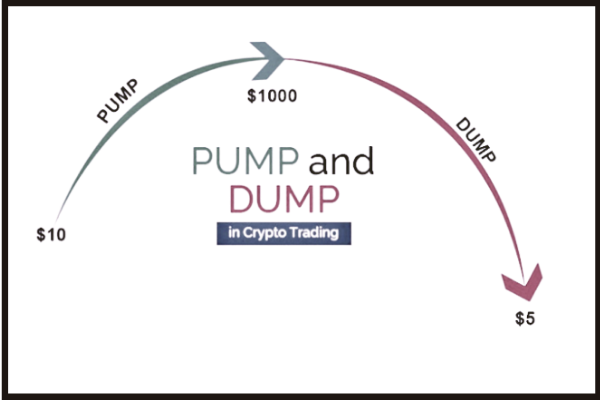In this article, we’ll go over the eight most prevalent cryptocurrency scams and how to avoid them.
Cryptocurrencies, no doubt have created millionaires over the years.
It has also proven to be a lucrative venture for all who seek to invest in the future.
However, this rise in value and mainstream adoption has come with consequences.
Individuals with good intentions want to invest and help shape the future of money.
But some criminals are hell-bent on defrauding others of their investments.
Without further ado, let’s expose these scams.
Top Common Cryptocurrency Scams
Identifying these scams at first glance will definitely save you a lot of money.
Here they are:
- Pyramid Schemes
- Fake Cloud Mining Schemes
- Fake URL And Sites
- Rug Pull
- Fake Crypto Influencers
- Giveaway Scam
- Pump And Dump Schemes
- Fake Telegram Groups
- SIM Swap Scams
- Pig Butchering Scam
Let’s take them one after the other.
1. Pyramid Schemes

The founding fathers of Multi-Level Marketing had great intentions in mind.
They used this marketing technique to get their products and services in front of more buyers, thereby increasing sales and growing their companies.
However, seeing the effectiveness of this marketing technique, fraudsters have deployed it in their criminal activities as well.
Unlike legitimate companies that recruit affiliates to help market their products and pay them commissions for their successful sales.
Scam platforms recruit affiliates to sell bogus claims and lie to unsuspecting individuals.
A majority of these individuals fall for the lies, invest their money, and boom! They are gone.
Most pyramid scheme owners are not new to the game.
An example can be found in the owners of Pyramid schemes like Bitclubadvantage, AWSmining, Bitworld Center, and FutureNet.
Here are a few tips to keep you safe from Pyramid Schemes (Ponzi platforms):
- Always seek a platform’s ownership info before making any investments. Ask yourself questions like:
- Is the CEO credible?
- Is his personality questionable?
- Check the platform’s legal status.
- Are they duly registered with the appropriate authorities to operate a financial platform?
- Can you sue them when things go wrong?
- Check past user feedback on forums and blogs.
- What do previous investors in this platform have to say?
- Do their products or services actually exist?
If a platform can answer the questions above correctly, invest in it.
2. Fake Cloud Mining Schemes

Image Credit: https://ethereumcode.io/
This is one of the most common cryptocurrency scams.
Cloud mining involves mining for cryptocurrencies by purchasing mining equipment from a third-party cloud provider.
Also Read: Beginner’s Guide to Bitcoin Mining
In recent times, certain fraudsters (criminals, thieves, robbers) have used “cloud mining” to cover up their illegal activities.
They create websites and platforms offering cloud mining contracts; promising users fixed daily earnings and huge ROIs.
They might also provide users with an opportunity to refer new investors and earn 10% of their investments, amongst other pyramidal bonuses.
Varieties of mining fraud exist. A typical example of cloud mining fraud is AWSmining.
These fraudsters can go to any length in their bid to make everyone believe their lies.
For instance, they could visit mining farms to record videos, claiming the farms belong to them.
Or visit hotels to rent conference rooms — claiming the rented conference rooms are their operational headquarters, etc.
Here are a few tips for identifying Scam Cloud Mining Service Providers like AWSmining:
- Ask yourself questions like – is the CEO credible, has he been involved with any previous scam platform?
- Do their mining farms actually exist?
- Who are the staff on these mining farms? Has anyone visited the farms apart from the company’s admins?
- Check past user feedback on forums and blogs. What do previous investors in this platform have to say?
- Check the platform’s traffic statistics on to know if citizens of the platform’s host nation are patronizing it. They say – charity begins at home.
- How does the platform operate, and are its activities accessible and transparent?
If a cloud mining service provider can answer the questions above correctly, invest in it.
3. Fake URLs and Sites

Another common crypto scam is fake apps and websites.
There are numerous fake apps and websites on the internet, and the crypto space is no exception.
Most of the time, these fake sites are masqueraded to look like legitimate, popular cryptocurrency websites.
Take a look at this:
The web address of Binance, www.binance.com, could be changed to something like www.binannce.com or www.binance.org. Oh, my! You almost skipped that, right?
Unfortunately, things like this are often overlooked. If you pay little attention to details, you may not become a victim.
On the other hand, it could even be a crypto investment platform that is entirely new to you, promising to pay you a bogus high ROI.
Here are tips to help you avoid falling for this scam:
- Examine the web domain address carefully to be sure it’s the one you’re looking for.
- Take a close look at the company’s logo. If you notice any discrepancies, there’s a good chance it is a fake one.
- Avoid making use of sites with no SSL certificate or “HTTPS.”
- If you notice the site is fake, do not click on any links. They may contain malware.
- If it’s an investment app that is entirely new to you, then consider checking out “Whois” for the company’s info.
Whois.com is a website where you can get information about an online company for free, from the founder’s information to the company’s lP address.
For instance, Metrocryptotrade.com is a company that claims it is based in the United Kingdom.
However, according to this 2020 research, the IP address was tracked to “Oshodi, Lagos State, Nigeria” using “Whois.”
Fast forward to today; the information about the IP address is no longer on Whois.
The truth is, these con artists will stop at nothing; they can even use Google ads to lure you in.
But trust me, if you are careful enough, you won’t fall prey.
4. Rug Pull

Rug pull is another cryptocurrency scam that you need to beware of.
It is common in DeFi, NFTs, and game collectibles.
A rug pull is a situation, where developers create new crypto tokens and promote them to investors to pump up their value and boost overall liquidity.
But they quickly drain the funding pool, thus sending the token’s value crashing to zero, and then they disappear with the money.
In 2021, the most prominent rug pull involved a token purportedly tied to the hit Korean Netflix drama Squid Game.
The SQUID coin surged as high as $2,861 in early November before tanking as the developers made off with an estimated $3.38 million in funds.
There is no doubt that DeFi and NFT have become a magnet for innovation in the crypto ecosystem.
Nevertheless, bad actors have made away with investor funds via such avenues.
A few tips to spot and avoid getting rug-pulled include:
- Conduct a background study on the project and the coin’s use cases.
- Visit the coin’s blockchain explorer to check the coin’s holders’ addresses. If the bulk of the coin is held in one or a few wallets, then it is a red flag.
- You should also check if the coin’s liquidity pool is locked. If it is not locked, then that is a bad sign because the developers can pull a rug on you at any time by withdrawing their funds.
- Do not buy a newly launched coin just because it has increased by 5x or 10x in a single day.
If you do your research properly, you will easily spot this scam.
5. Fake Crypto Influencers

Has a crypto influencer like Jude Umeano messaged you about an investment opportunity?
Nowadays, scammers pose as cryptocurrency influencers or celebrities to attract the attention of unsuspecting
These scammers are usually spotted on social media channels, such as Telegram and Twitter.
They pretend to be one of your favorite crypto influencers and have their faces as profile pictures.
How they operate is that they slide into your inbox with a well-crafted message, creating a sense of validity and urgency.
They tell you it is a “once-in-a-lifetime” opportunity so, you transfer funds quickly in hopes of an instant return.
You can easily fall for this type of scam because the social media accounts of the scammer look exactly like those of the public figures you know.
Please note that any supposed influencer requesting your tokens to multiply them for you or send you another one is a scam.
To avoid this type of scam, disregard any investment perks from a purported crypto influencer in your DM.
6. Fake Giveaway

This type of crypto scam is similar to the one that I just discussed above.
You have probably heard stories of how people were duped after receiving offers to double their BTC if they could send a certain amount of it to a certain address.
Sadly, millions of dollars have been pocketed by these fraudsters from their victims.
These scammers could be a fellow member in one of your Telegram groups or a social media account impersonating a popular figure.
They could even hack into the accounts of high-profile individuals and companies, like Elon Musk, Vitalik Buterin, Binance, Coinbase, and several of them.
As always, they send out messages that look like this:
“I am donating 400 ETH to the Ethereum community. The first 200 transactions with 0.2 ETH sent to the address below will receive 2.0 ETH”. 🤔
This type of scam is no longer new, yet people fall victim to it every day
A vivid example is the Twitter giveaway scam of 2020 and the Elon Musk fake giveaway of 2021.
There are also cases of scammers creating fake giveaways or airdrops using Telegram bots.
Usually, these bots will direct them to pay money to a wallet address. Once they do this, their money is gone forever.
Do not fall for this type of scam. Always ask yourself these questions:
- Has there ever been a genuine giveaway where you have to send money to the organizers first? If this is so, then what actually now makes it a giveaway?
- Do you ever think that someone like Vitalik Buterin would make such a public plea for ETH?
If your answer is “No,” then your guess is as much as mine. It is a scam!
7. Pump and Dump Schemes

Just like the name sounds, it involves two stages – Pump and Dump.
This is how it usually goes down:
The pump stage:
An individual (maybe a social media influencer) or a group tries to inflate the price of a coin.
They convince people to buy in by spreading false information about low-cap coins through social media, forums, and online communities.
And of course, their posts often contain embellished due diligence and a promise of an impending surge.
So, because of this large buzz, many investors will definitely want to buy into the project.
The dump stage:
When many investors have cashed in, the scammers will quickly sell off their holdings, bringing the coins’ value to virtually zero.
Here are a few tips to help you escape being a victim of a pump and dump:
- Do not be in haste to invest in a coin just because it is being hyped by social media influencers.
- You should not use social media platforms like Reddit and Twitter to track crypto movements.
Even the most experienced crypto trader can fall prey to pump and dump.
But the best way to avoid being a victim is to always conduct your own research before investing in a project.
8. Fake Telegram Groups

You should be aware that Telegram is littered with so many fake crypto groups.
These scammers will create a “catchy in the eyes” and easy to fall for the Telegram group that promotes a phony crypto project, probably a new one (or an NFT).
Then they request members to send Bitcoin or Ethereum to a particular wallet address to receive the new token.
Sometimes, they may use the logo or name of an existing project to get you to release your funds.
They may even go as far as using the face and name of a popular crypto influencer to make the project seem authentic but don’t fall for it.
For instance:
This channel has the face and name of Jude Umeano on it and it has already garnered 4, 626 subscribers.
I can only imagine how much those people have lost to these scammers hoping to receive money from them.
It could even be a legitimate group but you know, scammers are literally everywhere.
They’d pose as admins or customer support for the group.
In a bid to help you solve technical issues, they request private keys or passwords, and when you fall for them, they steal your funds.
Please, do not fall for this scam. I will give you some tips to spot it and avoid becoming a victim below:
- Whenever you’re invited to a crypto project’s Telegram channel or group, and they’re asking for funds before you receive an airdrop, it is most likely a scam.
- Beware of Telegram groups that promote crypto HYIP websites.
- If it resembles a legit platform that you think you are familiar with, go to the project’s website and confirm that the Telegram link on the site leads to the same place.
- Another point is that a real admin will never ask for your private key or password. There’s a reason why they are called “private.” Keep them to yourself.
There you have my 8 common crypto scams. Kindly scroll down to the next section where we will conclude the post.
But before you go, the P2P scam is another one you should beware of. In this post, we have covered how this scam is being carried out in detail.
Do you want to learn how to trade cryptocurrencies profitably?

We developed a perfect course to help you master Cryptocurrency Trading.
Go to www.ctmastery.com to enroll. You can also join our Telegram community at https://t.me/ctmastery for more information.
Conclusion
We have reached the end of our discussion on cryptocurrency scams.
There is absolutely no point in being scared of investing in cryptocurrencies.
Many people have been successful in this venture and you can be successful as well.
However, always do your due diligence, ask questions when something is not clear, and don’t fall for opportunities that seem too good to be true.
We at Nigeriabitcoincommunity are here for you 24/7. You can reach us via
- E-mail: info@nigeriabitcoincommunity.com
- https://www.facebook.com/ctmasteryofficial
- Twitter. https://twitter.com/NigBtcCommunity
Enjoyed reading this review? Please share the word by clicking on your favorite social media icon below.
Thank You.
Also read:



Thanks alot for the info
You are welcome. Please share.